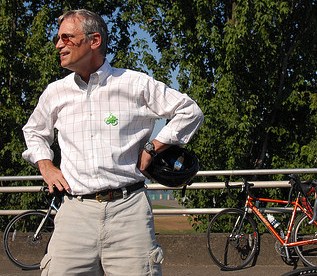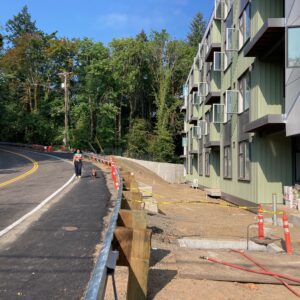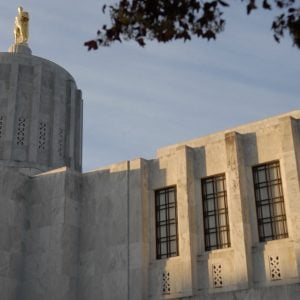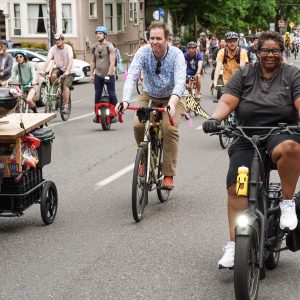
(Photo © J. Maus/BikePortland)
As the dust has settled a bit on the new, two-year transportation bill that was passed last week, it’s time to start understanding what it means for bicycling going forward. On Friday, I got a chance to talk about it with one of the most important national figures for bicycling, U.S. Congressman Earl Blumenauer.
Blumenauer is not only regarded as a major champion for bicycling in Congress, as a member of the House Ways and Means Committee, he also had a seat at the table of the conference committee that hashed out the final bill. At the outset of our conversation, I could hear from his voice that he was exasperated after what must have been a bruising negotiation process.
“I am literally spending the weekend and early next week working with some folks to start the push back… This is a call to arms, we’ve got two years for people to realize this stuff really matters.”
To quickly reset, GOP leadership in the House came out with a bill (H.R. 7) that was so off-base they couldn’t even pass it with their majority. The Senate bill (MAP-21) was much-preferred among active transportation advocates. After it passed the Senate with bipartisan support, many hoped the House would just adopt it, pass it, and we could move forward. But of course, that didn’t happen.
An obstinate House GOP refused to take up the Senate bill, so a conference committee was set up and the two chambers negotiated through each component of the bill to finally reach an agreement. While the bill is an improvement over H.R. 7, the Senate Bill traded away a lot during the committee process. What we are left with, according to experts, is a very disappointing bill whose only silver lining is that funding for biking wasn’t stripped away completely.
Blumenauer couldn’t quite put a finger on just how he felt as he traveled back to Portland for the Fourth of July recess. Do you feel tired/frustrated/relieved/happy? I asked: “It’s just weird,” he replied, “I little bit of all of the above.”
He continued, “It’s such a missed opportunity. We really had a chance for the Senate to hold firm and they didn’t. If it was up to me I would have called their bluff because the pressure was mounting.”
As to why the Senate caved in the negotiations, Blumenauer said it was simply pressure. “The clock was ticking and they saw what the Republicans did on the debt ceiling and they allowed FAA funding to completely expire… I think the Senate just thought they’d [the House GOP] actually just shoot the hostage.”
Straining for some good news, Blumenauer said that, given how terrible the House bill was, “Part of me feels that it’s a modest victory that we were able to beat back the bad stuff.”
Modest victory aside, there’s still a lot of bad stuff in the bill that passed. Blumenauer called the “gutting” of the Safe Routes to Schools program, “gratuitous” and “really weird.” Now that three years of work to try and make this a good bill is over, Blumenauer is resigned: “It is what it is.”
He’s also wasting no time in setting the groundwork to pass a better bill when this one expires in September 2014 (thankfully, this bill only lasts 27 months, instead of the usual six year length).
“I am literally spending the weekend and early next week working with some folks to start the push back… This is a call to arms, we’ve got two years for people to realize this stuff really matters.”
Blumenauer said he intends to tap into the broad coalition that formed around opposition to H.R. 7 (600 organizations and politicians signed a petition against it). He wants elected officials and those campaigning for House seats to hold local forums on transportation issues. He wants people to keep the discussion going and to use the new bill as an example of what not to do.
One reason the bill passed despite these concerns from high-profile leaders like Blumenauer is that it became known as the “jobs bill” and it also included a student loan provision. In short, a “no” vote on this bill would have been political suicide.
Even without the “jobs” label or the student loan provision, Blumenauer told me he would have still voted for the bill. He worried that yet another short-term extension and another partisan impasse would have “frayed the coalition.” “If things really got toxic, who knows what would have happened,” he said, “We need to keep that coalition united as much as we can.” he said.
When that day comes, Blumenauer is very optimistic. Several times during our conversation he mentioned that he’s gotten calls and emails of support from road building trade and construction groups who are, “All in this with us. They’re appreciative of what we’re doing and are also looking at the long-term.” Blumenauer said that aligning with those powerful lobbies is how we’ll get a “bigger vision enacted” come 2014.
When it comes to the national bicycling movement in general; Blumenauer said the disappointing new bill is more a sign of the “toxic nature of House politics” than a cause to switch tactics. He believes the movement is headed in the right direction and that, “After all this work, we just can’t abandon where we’re at.” [Trek Bicycle Corp. President John Burke wrote last week that, “Too many people sat on the sidelines and as a cause we need to be better organized next time around.”]
He feels the House GOP is so out of touch on transportation issues that it will cost them in the next election. “There are some thing that are almost impossible to defend,” he said. In particular was a vote in the House last week that approved an amendment to prevent any further research by the US DOT into a vehicle miles traveled tax.
A VMT tax is seen by many experts as one of the most viable options to the floundering gas tax. Blumenauer himself was instrumental in pushing for a pilot research project in Oregon years ago that has begun to bear real fruit at the state level.
“No research, not testing, no pilot programs, nothing,” Blumenauer said about that vote with a sad laugh, “There’s great interest in what we’ve done in Oregon, and everybody with their wits about them knows we have less than a decade to make the transition to something other than the gas tax.”
With this fight (which could have been much uglier) now in the rear-view mirror, Blumenauer feels that he and other reformers are “living to fight another day.”
Check out a full breakdown of the new bill (including side-by-side comparison with existing bill) by America Bikes.






Thanks for reading.
BikePortland has served this community with independent community journalism since 2005. We rely on subscriptions from readers like you to survive. Your financial support is vital in keeping this valuable resource alive and well.
Please subscribe today to strengthen and expand our work.
The House republicans have displayed a knack for destroying American infrastructure that far exceeds the abilities of Al Qaeda. How ironic.
Is line item veto a possibility?
That would be insanely unpopular. If he were planning this, the left would be out in full force denouncing the bill already.
No. And that’s OK with me. Signing statements are common, but they are double-edged swords, too. Somehow I have the feeling that a highway bill which addresses reality in the coming decades is going to come from a forced hand. *sigh*
How much money has gone into this VMT tax system when Oregon (and the Feds for that matter) could simply raise the gas tax.
It’s a good proxy for miles driven and punishes drivers who want large, fuel-inefficient vehicles.
That would be fine, but what we have today are more fuel efficient vehicles as a whole, so there’s just as much driving just less fuel. This is a great thing for lessening our dependence on fossil fuels but the wear on the roads are still in the same situation. It’s not about punishing drivers, it’s about creating a tax base that will have a direct correlation with the wear and tear on our nation’s roads. The gas tax is out moded and the VMT is the rational way to collect the revenue we need to keep our infrastructure in good repair.
” . . . it’s about creating a tax base that will have a direct correlation with the wear and tear on our nation’s roads.” That’s what the gas tax does. Just raise it.
It will cost more per mile driven, but does the same thing in terms of raising revenue “to keep our infrastructure in good repair.”
Saying that it’s outmoded doesn’t make it so. And if it were as simple as collecting the tax differently I’d understand that. But this entire model requires every car to have these instruments in them. It’s a huge waste of money that doesn’t do anything substantially different that can’t be done by simply raising the gas tax.
I agree that raising fuel tax is long overdue (and make it a fraction of price, not gallons) but that leaves electrics and alternative fueled vehicles untaxed. That’s arguably good for a transition incentive but eventually, as those vehicles become more common, it leaves roads underfunded and those vehicles will need to pay their share.
Another option is tire tax.
Then tax alternative fuels or tax the batteries.
The gas tax is a nearly perfect use tax with the right incentives. Expand upon it. Don’t throw it out for a system that will cost billions, disincentivize fuel-efficient vehicles, and be invasive.
Raise the existing tax and add new ones, in the same Congress that gave us this bill…hmm.
This sounds a lot like his policy plan for many things. Take the “steam out” of the republicans by taking a passive role. Only to get steam rolled and then offer an apology or blame the republicans. Even if this is a jobs bill he should vote no. If they combine war with jobs, vote no.
the democratic party is a potemkin party.
I contacted Blumenauer’s office about our initiative to Ban Studded tires in Oregon. I talked several times with his asst. Willie Smith, but never to Earl. Saving money and reducing CO2 are several of the many benefits, if studded tires were banned. Saving money could help free up money for some of the things they felt we couldn’t afford. Asking for more money is easy, savings is where the “new” money is going to be found.
The more I learned about studded tires and the damage they do to OUR roads and the environment, I felt when the Ban took effect in Oregon, it would be seen as a model for the nation. New Stud less tire technology has come so far that studs are pretty much obsolete.
Were taking the initiative to Salem, please write your representative and tell them you want some action on the studded tire legislation that is being proposed.
Thanks
But most states in the US already ban studded tires.
“A VMT tax is seen by many experts as one of the most viable options to the floundering gas tax.” I am absolutely opposed to a VMT unless it accounts for vehicle size and weight. Taxing an Escalade driver the same as a Civic driver would be ridiculous and disastrous. The Escalade uses 3x the energy, spews 3x the emissions, takes up a lot more space (both on the road and while parked), causes 27x the road wear and poses many times more danger to other road users.
Of course, as already pointed out the gas tax already does more or less account for vehicle size and weight, and penalizes aggressive driving to boot … the better solution is to grow some political balls and raise the gas tax already.
I’m not too worried about EVs not “paying their fair share”. They are, and for quite a few years will continue to be, such a miniscule share of road use that it doesn’t really matter and taxing them would make as much sense as registering and taxing bicycle owners. And the fact that we’re effectively subsidizing them by not taxing their fuel is fine with me. When batteries get energy-dense enough and cost-effective enough to make large electric SUVs practical and affordable, then we can talk about an alternate way of taxing them. But that is many, MANY years off.
We tell ourselves that raising the gasoline tax is politically suicidal. (unhelpful, self-fulfilling, unempowered–but let’s skip over that for the moment)
Then someone cooks up a complicated and expensive variant that is called a VMT tax. Presumably the guy who came up with this thinks that because it isn’t called a gasoline tax it stands a better chance of passing. Not only that, but it’s hypothesized better chances more than outweigh its complexity, expense, and flaws.
What a weird way to go about this. Why not just raise the gas tax. Has anyone actually tried to do this of late? What do we imagine to be so magically different about (nearly) everyone else in the world–who live in countries that have real gasoline taxes that discourage frivolous driving and raise real money?
I’m also puzzled. A VMT would be even more unpopular I would think – at least folks mostly accept that there should be some sort of gas tax.
If you don’t have the political power to raise the gas tax somehow it’s supposed to be possible to introduce a completely new one instead?
The basic problem is that Big Oil owns most of Congress. Until you fix that issue it’s going to be very hard to fix anything else.
Being clear on that would be a good start…
Also, it’s good to see that the Republicans are perfectly okay with deficit spending, provided it goes towards subsidizing highway spending… and it seems they are okay with deficit war spending as well.
Do we know who in the Senate authored the mandatory side-path provision?
Google was useless in trying to get that information.
“Do we know who in the Senate authored the mandatory side-path provision? …” Mark Allyn
Don’t think there is any such federal critter, human or law. The bike lane use laws seem to be state creations that citations are rarely issued for violations of, and that most people never bother to read, learn an understand, leading some of them to get overly upset about not much at all.
This might be of some help:
http://bikelaws.org/ Excerpt: “…There is no federal traffic law. Traffic law is a state function, and the troublesome add-ons are state (and local) laws. …”
What! There’s a mandatory sidepath provision in this bill?
Yes, Jonathan mentioned it last week. The language is:
WRT Mark Allyn’s question, there is discussion on BikeLeague about MAP-21. One poster asked, “…who put that paved path language into the bill in the first place?” and another answered, “Yes, we were able to identify the source and we’re working with various folks to find a solution,” but no further identification of the MSP author. I’d like to know, too.
There’s also a slide presentation by Ginny Sullivan of BikeLeague about it, including examples of particular roads which will be affected, many National Parks etc. but also several roads in the DC area, and questions about what other roads might fall under the law (p 11, 12). It also mentions that Sen. Merkley and Franken offered amendments to strike the MSP which were rejected by the committee chairs, and Merkley offered the bike level-of-service (BLOS) language which was accepted.
Okay…I wasn’t paying attention( read the LAB/bikeleage article…thanks Alan): ‘provision’ as part of this bill, rather than law applied which I suppose it could become. Inclusion of the provision into the bill appears to be arbitrary, and its specific coverage, vague.
Unlike for example Oregon’s bike lane use law 814.420, it lacks subsections with language covering a range of valid reasons road users riding bikes would have for riding the main lane of a road rather than a bike lane on the right side of the road or a bike path or MUP some distance adjacent to it.
Also notice that the provision isn’t directed to road users but to secretaries of federal land use agencies.
Though the area focused on by the federal transportation bill bike path provision language:
“…each federally owned road that has a speed limit of 30 miles per hour or greater and an adjacent paved path for use by bicycles within 100 yards of the road unless the Secretary determines that the bicycle level of service on that roadway is rated B or higher.”
…is relatively narrow, in comments to the LAB/bikeleage, without citing specific examples, people do express concerns that the fed bill provision could have potential to stand as a precedent used at a later date to apply restrictions to bike travel on a range broader than federal roads.
Thank you. I looked at the BikeLeage blog and saw the references.
I don’t know if it’s worth going onto that blog and asking for the names of the sources only because we should contact the bike clubs and bike shops in those senators’ districts in an attempt to start a movement in those districts to get rid of them.
Is it worthwhile for me to go onto that blog and attempt to demand the names?
I don’t think so. The poster who said that is on the LAB board and he’ll stick to their policy; if they’d wanted to announce that name, they already would have done it. Of course, if they have that info then so do others, and it’s probably all public record (Congressional Record, etc), so a good investigative journalist with the right credentials and reputation could probably dig it out from one source or another.
Thank you, Alan.
Ginny Sullivan is the Special Projects Director for Adventure Cycling Association. She is not with the BikeLeague, by which I think you mean the League of American Bicyclists. It is Adventure Cycling Association that is spearheading the efforts toward the United States Bicycle Route System (USBRS).
Thanks for clarifying Sullivan’s role at ACA (and it also explains slide #6 in that deck which says “Adventure Cycling & League Strategy”).
Can you share any enlightenment about who added the sidepath language to the bill?